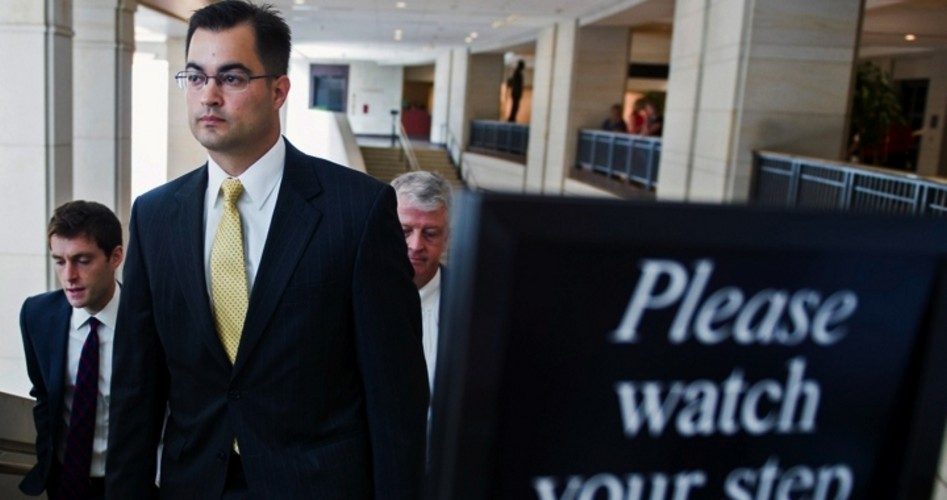
One question that has been hovering in the background of Hillary Clinton’s e-mail scandal is whether she allowed classified information to be viewed by anyone without proper clearance. On Wednesday, that question was moved to the forefront when Senate Judiciary Chairman Chuck Grassley (R-Iowa) sent a letter to a former Clinton aide who had been tasked with sorting the e-mails to determine which should be deleted. Grassley wants to know whether that aide, Heather Samuelson, possessed the appropriate clearance to view the hundreds of e-mails which are now known to have been classified.
The New American asked similar questions about Clinton IT staffer, Bryan Pagliano (shown), who — like Huma Abedin — had a special arrangement with the Clintons to work for Hillary as both a federal and a private employee. Pagliano began working for Hillary during her failed 2008 bid for the White House. He served as the IT director for her campaign and was then hired to work at State by Hillary when she became secretary of state in 2009. He continued to work privately for the Clintons, managing the server that is at the center of this controversy. In September, this writer asked, among other questions:
• Was he privy to the classified data that is known to have been stored on the server?
• If so, did he have clearance to access that classified data?
As we said then, “It could prove to be a trying time for Pagliano as he tries to avoid the questions that could very well put him in jail.” When called to testify before Congress, Pagliano invoked the Fifth Amendment’s protection against self-incrimination and has refused to answer any questions.
Politico is now reporting that Grassley is ramping up his investigation and that he and Homeland Security Chairman Ron Johnson (R-Wis.) have “sought to speak with Bryan Pagliano, Clinton’s personal IT staffer at State, who has invoked his Fifth Amendment rights.” Grassley and Johnson will not be put off so easily, though. As Politico reported:
After Pagliano refused to answer questions from congressional investigators, Grassley and Johnson asked State for Pagliano’s emails in the hopes of learning more about his maintenance of the Clinton server — messages they still haven’t received in full. They’ve also sought unsuccessfully to speak with Pagliano’s supervisors.
To press the matter further, Grassley sent a letter to Clinton aide Heather Samuelson, asking her about both her clearances (if any) and the process she used to decide which e-mails to delete and which to turn over to the government. The law requires that all work-related e-mails be turned over. That would apply even to an e-mail that was primarily personal if any part of it refers to anything work related.
The letter, which was obtained by Politico, says in part:
According to recent news reports, Secretary Clinton chose you to initially sort through her emails to determine which emails were official work related and which were personal. News reports further indicate that Ms. Cheryl Mills and Mr. David Kendall supervised your efforts. The Judiciary Committee has been investigating the alleged failures of Secretary Clinton and her attorneys to properly preserve and maintain federal records. In addition, the Committee has been investigating the possibility that Secretary Clinton’s attorneys were unlawful custodians of highly classified government information. For example, the Intelligence Community Inspector General (IC IG) notified the Committee that at least two emails on Secretary Clinton’s server were — and are — classified at the Top Secret/Sensitive Compartmented Information (TS/SCI) level. Importantly, according to the IC IG, the classified information in the emails was classified at that level when the emails were created. News reports now indicate that hundreds of Secretary Clinton’s emails are classified.
The New American reported about those “hundreds of Secretary Clinton’s emails” which are now known to be classified:
Before turning over the server, Clinton turned over a USB thumb drive containing samples of the e-mails stored on the server. Charles McCullough, inspector general for the intelligence community, told Congress last week that of the 30,000 e-mails on the USB drive, 40 of them were randomly selected for the purposes of seeing whether they contained sensitive information. Of those 40, two contained information classified as “Top Secret/Sensitive Compartmented Information.” Doing the math, McCullough estimates there could be hundreds of e-mails on Clinton’s server that were “Top Secret.”
Considering the direction of Grassley’s investigation, it now seems clear that this was — and is — the case. Grassley’s letter to Samuelson continues:
It is not clear what level of security clearance you had at the different stages of this process, if any. However, one of Secretary Clinton’s attorneys, Mr. Kendall, purportedly had a Top Secret clearance issued by the Department of State, and it appears the FBI determined that his Top Secret clearance was insufficient to allow him to maintain custody of the emails, some of which contained information classified up to TS/SCI. That particular classification generally requires advanced protocols such as a Sensitive Compartmented Information Facility (SCIF) and other similar arrangements to possess and view. Thus, the FBI is now in custody of not only the thumb drives previously in Mr. Kendall’s possession, which contained information you reportedly reviewed at one point, but also Secretary Clinton’s personal server that was used to maintain Top Secret information outside of a government facility. The FBI has also reportedly taken possession of four servers from Department of State headquarters.
Given the importance of securing and protecting classified information, especially TS/SCI material, it is imperative to confirm when, how, and why you, and any of your associates, received a security clearance in connection with your work on behalf of Secretary Clinton and whether it was active while you had custody of Secretary Clinton’s emails. Further, it is imperative to understand your background in determining what is and what is not a federal record, since you apparently played a major role in assisting Secretary Clinton in making a decision as to which emails to delete.
In a separate article, The New American previously reported that at least one e-mail Abedin sent to Hillary was — and still is — classified. Because Hillary involved her aides in her parsing of these e-mails, they may well share in her legal troubles that result from that decision. As we said then:
Mrs. Clinton and Huma Abedin may face serious jail time for communicating about classified matters over unsecured networks. They may not have to face it alone, either. Anyone principally involved in the release of a trove of e-mails to the State Department’s website in the wake of the Benghazi scandal may be in deep trouble as well. That cache of e-mails included the “smoking e-mail” which, though classified, Abedin sent to Hillary’s private e-mail address.
U.S. law deals severely with those who mishandle classified information. Since it is now known that Hillary signed two non-disclosure agreements (NDAs) as part of her appointment to the position as secretary of state, she cannot claim ignorance of the degree to which she mishandled highly sensitive information. The Espionage Act, in particular, allows imprisonment up to 10 years for violating the chain of custody of classified information. It does not require intent, either. “Gross negligence” is sufficient cause to be found guilty.
Subsection (f) of 18 US Code 793 says:
(f) Whoever, being entrusted with or having lawful possession or control of any document, writing, code book, signal book, sketch, photograph, photographic negative, blueprint, plan, map, model, instrument, appliance, note, or information, relating to the national defense,
(1) through gross negligence permits the same to be removed from its proper place of custody or delivered to anyone in violation of his trust, or to be lost, stolen, abstracted, or destroyed, or
(2) having knowledge that the same has been illegally removed from its proper place of custody or delivered to anyone in violation of its trust, or lost, or stolen, abstracted, or destroyed, and fails to make prompt report of such loss, theft, abstraction, or destruction to his superior officer—
Shall be fined under this title or imprisoned not more than ten years, or both.
Unfortunately for the others involved, including Abedin, Mills, Pagliano, and Samuelson, because Hillary involved them in her mishandling of classified information, they may have run afoul of the Espionage Act as well. Subsection (g) of 18 US Code 793 says:
(g) If two or more persons conspire to violate any of the foregoing provisions of this section, and one or more of such persons do any act to effect the object of the conspiracy, each of the parties to such conspiracy shall be subject to the punishment provided for the offense which is the object of such conspiracy.
As this investigation and the separate investigation being conducted by the FBI continue to heat up, someone is likely to wind up in prison. Whether that someone will be Hillary depends largely on how the others play their hands.
Photo: AP Images




